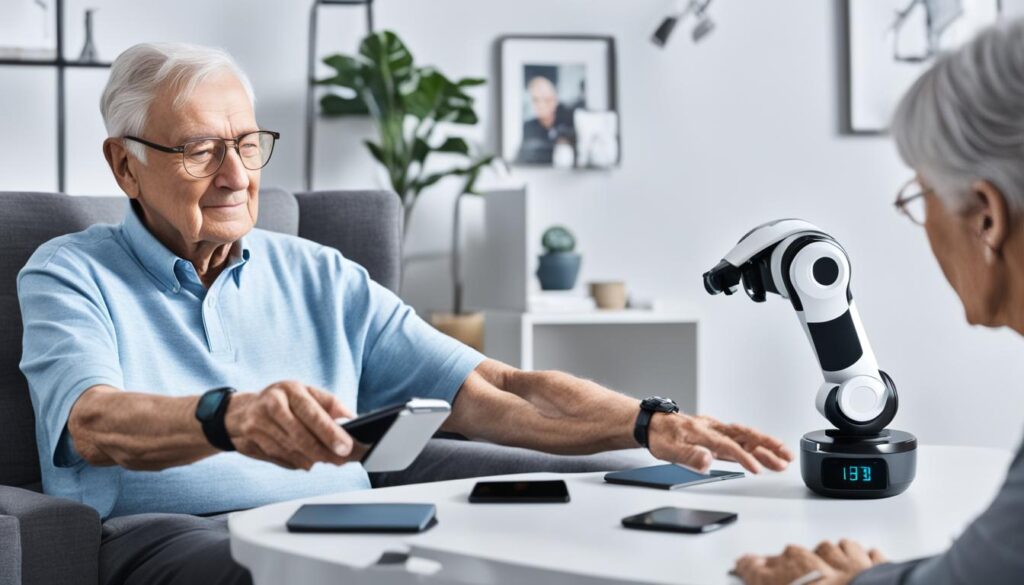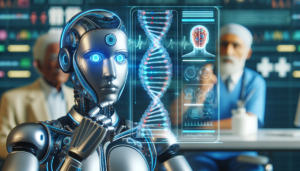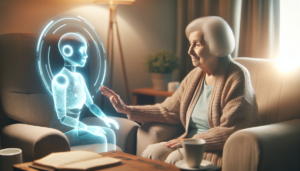In an era where digital innovation knows no age limit, AI for Seniors is emerging as a cornerstone in redefining eldercare. This isn’t just about keeping pace with the times; it’s about harnessing the power of senior-friendly AI to enhance and sustain the quality of life for our aging population. With thoughtful integration of AI technology for the elderly, an array of opportunities unfold to ensure that the golden years are lived with dignity, comfort, and independence. Let’s explore how the synergy of AI and eldercare is unfolding a promising new chapter for seniors everywhere.
Key Takeaways
- AI opens new horizons for senior care, offering personalized and proactive health management.
- Senior-friendly AI applications foster independence, ensuring comfort and safety at home.
- AI technology for the elderly provides vital social engagement, combating isolation and loneliness.
- Adaptive AI solutions cater to the unique requirements of seniors, promoting ease of use and accessibility.
- The role of AI in eldercare is pivotal in shaping a future where the elderly can thrive with autonomy and connectedness.
The Potential of Artificial Intelligence for Seniors
As the silver wave of the aging population crests, Artificial Intelligence (AI) emerges as a beacon of innovation, redirecting the tide of eldercare towards a horizon brimming with potential and promise. Leveraging AI health monitoring for seniors, AI home assistance for seniors, and AI-based social interaction for seniors, we are witnessing an unprecedented alignment of technology with the nuanced needs of the elderly. This fusion is not only reshaping the landscape of senior care but is also affirming the capabilities of our elders to lead enriched, autonomous lives.
Enhanced Quality of Life Through AI Applications
The advent of AI in senior living spaces is pivotal, offering enhanced quality of life with a suite of applications designed to cater to the individual needs of our elders. Technologies such as advanced wearable devices and virtual assistants are now cornerstones in proactive health management, facilitating continual AI health monitoring for seniors that helps maintain their health and well-being. The personal touch of AI doesn’t just monitor; it cares and guides, with reminders for medications and interactive platforms that simplify the management of chronic conditions.
Breaking the barriers of isolation that often accompany aging, AI-based social interaction for seniors leverages the power of connectivity to foster meaningful relationships. Through interactive chatbots and immersive experiences afforded by virtual and augmented reality technologies, seniors are empowered to stay socially engaged, stimulating their cognitive abilities and sustaining their mental health.
Addressing the Challenges of an Aging Population
AI is not just an ally in enhancing the daily lives of seniors—it’s a strategic partner in addressing the challenges posed by an aging demographic. Elder care AI solutions provide support that extends beyond simple task automation, venturing into realms of cognitive assistance and safety. By integrating AI into the very fabric of healthcare and daily assistance, AI equips seniors to navigate the intricate dance of aging with grace and dignity.
Furthermore, the innovative applications of AI in eldercare serve as bulwarks in safeguarding seniors. From AI for dementia patients – targeting the specialized needs of cognitive support – to AI-powered transportation solutions that bolster mobility, the reach of AI spans the full spectrum of eldercare needs. Its versatile capabilities herald the emergence of an age-agnostic technological era where every senior stands to gain a renewed sense of freedom and security in their cherished living environments.
In essence, the integration of Artificial Intelligence in senior living solutions carries with it the potential to transform eldercare from a narrative of dependency to one of enablement. The technological advancements in AI not only promise to enhance the day-to-day experiences of seniors but also to enshrine a future where the wisdom of our elders is supported by the intelligence of the systems designed to serve them.
Revolutionizing Senior Healthcare with AI Health Monitoring
The landscape of healthcare for the elderly is undergoing an exciting transformation, thanks to the integration of AI healthcare for seniors.
Early Detection and Real-Time Alerts via Wearable Technologies
Wearable technology for health monitoring stands at the frontier of this revolution. By equiping seniors with devices that monitor vital signs like heart rate and blood pressure, anomalies can be detected at their onset. This proactive approach is further augmented by the real-time notification systems that immediately inform both caregivers and medical professionals, laying the groundwork for prompt action and potentially life-saving care.
Personalized Care Through AI Algorithms
Personalized healthcare AI takes this a step further by distilling large sets of health data into actionable insights tailored to each senior’s needs. The power of AI is in its ability to adapt and learn, offering AI personal care plans that are not only personalized but also dynamic, adjusting as the individual’s healthcare needs evolve.
By coupling wearable technology with sophisticated AI algorithms, seniors are receiving care that is both immediate and finely tuned to their personal health situations. This union of technology and personalized medicine is setting a new standard in elder care – one that cherishes the individual at every level of care.
| AI Healthcare Feature | Benefits for Seniors |
|---|---|
| Continuous Health Tracking | Allows for constant vigilance over potential health issues. |
| Anomaly Detection | Early warning system that identifies critical changes in health status. |
| Real-time Alerts | Quick notification to caregivers to facilitate swift responses. |
| AI-Powered Recommendations | Offers personalized health advice and activity suggestions. |
| Medication Reminders | Helps seniors maintain their medication regimen accurately. |
The concerted efforts towards integrating AI into esenior healthcare are not just improving the quality of care but are also empowering seniors with a greater sense of control and independence regarding their health and wellness. This is the future of senior living – one where technology empowers and amplifies the human touch.
AI in Senior Mobility and Accessibility: Fostering Independence
The accelerating pace of AI development heralds a new era of independence for seniors, with AI in senior mobility and accessibility opening doors to enhanced freedom and autonomy. Particularly transformative are the self-driving vehicles for seniors, a technological marvel redefining what it means to travel independently in our golden years.
As physical capabilities begin to present challenges, AI technologies step in, offering versatile solutions that tailor mobility options to the unique needs of the elderly. These innovations are not merely pie in the sky; they are active applications designed to ensure that seniors continue to navigate their surroundings safely and effortlessly.
The thrill of autonomous travel, once a sci-fi dream, is now approaching reality through advancements in self-driving technology. No longer confined by limitations in vision, reflexes, or motor skills, seniors are finding new opportunities to venture out, engage with their communities, and retain an essential sense of independence.
- Safety First: AI systems enhance travel safety, analyzing real-time data to make split-second decisions that human reflexes may not match.
- Accessible Journeys: Self-driving vehicles for seniors are designed with accessibility in mind, making ingress and egress seamless for those with mobility challenges.
- Smart Navigation: AI-powered navigation apps consider the most accessible routes and rest stops, and provide updates on traffic conditions.
Perhaps one of the most palpable benefits is the reduction of dependency on public transportation, which might not always cater to the specific needs of an aging population. Self-driving vehicles offer door-to-door service, improving accessibility in a way that public transport systems often struggle to achieve.
| Feature | Function | Benefit to Seniors |
|---|---|---|
| Autonomous Navigation | Guides vehicles through traffic | Reduces the need for manual driving ability |
| Voice-Activated Controls | Allows hands-free operation of vehicle features | Addresses physical restrictions and enhances ease of use |
| Real-Time Traffic Analysis | Adjusts routes based on current conditions | Optimizes travel time and ensures timely arrivals |
| Emergency Response Integration | Connects with emergency services if needed | Provides peace of mind and rapid assistance |
In conclusion, the smart integration of AI in senior mobility not only broadens the horizons of what is possible for older adults but also imbues daily life with a renewed sense of freedom. As AI continues to evolve, its potential to fortify the independence of our seniors grows alongside, providing both practical mobility solutions and the promise of an even more connected future.
Enabling AI-Based Social Interaction for Seniors
The promise of AI-based social interaction for seniors is unfolding as a reality where technology not only serves but also socially engages the elder populace. In this digital renaissance, AI tools are being finely tuned to pierce the veil of solitude that frequently shrouds the lives of many seniors, providing a bridge to the wider world through innovative interaction platforms.
Combatting Loneliness with Virtual Companions
At the forefront of this transformation are virtual companions for seniors, interactive AI entities that transcend the role of mere assistants to become social partners. Whether it be through a comforting chat, an upbeat exchange, or a game that sharpens the mind, these AI companions enrich daily routines with friendly banter and intellectual stimulation. Moreover, their capacity to learn and adapt to the individual personalities and preferences of their human counterparts makes these interactions all the more valuable and meaningful. Imagine an AI friend that remembers a senior’s favorite stories, or is equipped to discuss topics of interest, making each day feel a little less lonely and a lot more connected.

Maintaining Family Connections Through Technology
The marvels of modern digital communication tools extend well beyond artificial relationships. They facilitate an invaluable continuity of real-life bonds through platforms designed to unite. Social media for seniors and video chat applications skillfully stitch the fabric of family ties across distances, enabling grandparents, siblings, and old friends to share moments, celebrate milestones, and nurture relationships through the glow of a screen.
These platforms have developed to prioritize ease of use, ensuring that interactions are not hindered by overly complex systems or cumbersome interfaces. Consequently, the fear of technology is dissipating, revealing a digital realm rife with potential for enhancing the social lives of the elderly—a touchstone for emotional well-being and sustained relational health.
- Virtual Reality (VR) experiences for reminiscence and cognitive engagement
- AI chatbots for daily conversation and mood upliftment
- Video chat platforms for bridging the physical divide between family and friends
- Social media presence, keeping seniors informed and active in their communities
Optimizing Home Environment with AI Home Assistance
Advancements in AI home assistance for seniors are paving the way towards creating a living space that provides the utmost comfort and safety. These smart solutions are specifically tailored to adapt to the lifestyle of the elderly, making everyday tasks effortless and secure. By integrating sophisticated technology into the home environment, seniors can enjoy a sense of independence and tranquility in their golden years.
Smart Home Adaptations for Comfort and Safety
Personalizing the home to cater to the unique needs of seniors is essential for their well-being. Innovations in smart home technology for the elderly have resulted in systems that can control various aspects of the home environment. From automating lighting to regulating temperature, these systems ensure a comfortable atmosphere for residents. Moreover, integrated fall detection provides an invaluable layer of security, promptly signaling for aid in the event of an accident.
Assistive Voice-Activated Devices
Voice-activated AI assistants, like Amazon’s Alexa or Google Assistant, have become invaluable assets in the daily lives of many seniors. These devices are more than mere gadgets; they act as personal aides, responding to voice commands to assist with a myriad of tasks such as ordering essentials, managing schedules, or even connecting with loved ones.
| Device | Function | Benefit for Seniors |
|---|---|---|
| Smart Thermostats | Automates temperature control | Provides a consistently comfortable living environment |
| Smart Lights | Enables remote control of lighting | Increases home safety and reduces fall risk |
| Voice-activated Speakers | Facilitates tasks via voice commands | Empowers independence, simplifies daily activities |
| Fall Detection Systems | Monitors and alerts in case of falls | Ensures timely assistance and peace of mind |
| AI Security Systems | Monitors home safety, detects intruders | Guards against potential home security threats |
As the adoption of elderly-friendly smart devices continues to grow, the blend of comfort and tech-savvy security measures is helping to sculpt a future where the home is not just a dwelling, but a sanctuary catered for the needs and safety of its senior inhabitants.
AI for Memory and Cognitive Support: A New Frontier
The advent of AI for memory and cognitive support stands as a testament to the transformative power of technology in enhancing our mental faculties. Cognitive decline, often seen as an inevitability with aging, is no longer a roadblock with the integration of cognitive-enhancing technology specifically tailored to bolster memory retention and cognitive skills.
With innovative applications surfacing, AI tools offer a supportive hand to seniors and individuals facing cognitive challenges, carving a pathway to a mentally engaged and active lifestyle. Interactive experiences, which include brain-training games and virtual reality simulations, stretch the boundaries of traditional memory aids, turning everyday engagement into opportunities for cognitive stimulation.
The union between AI and cognitive wellness paves the way for custom experiences that temper technology with a human touch. Through the mastery of algorithms and user-centric designs, AI creates a personalized journey for memory enhancement. From learning new skills to recalling cherished memories, these cognitive-enhancing technologies are playing a pivotal role in maintaining cognitive vitality.
- Brain-training modules harness the power of AI to adapt to the user’s performance, scaling difficulty and type of memory tasks to provide optimal challenge.
- Vivid VR experiences immerse users into settings that can trigger memory recall and offer new forms of mental exercise.
- Digital assistants provide conversational interactions that encourage mental agility, offering companionship with cognitive benefits.
In sum, AI is not just contributing to the maintenance of cognitive health but is actively enhancing it, carving out a new frontier where memory and mind remain as sharp as ever. The table below compares different cognitive-enhancing technologies and their specific applications for memory and cognitive support.
| Technology | Application | Benefits for Cognitive Support |
|---|---|---|
| AI Brain-Training Games | Memory exercises, problem-solving tasks | Improves short and long-term memory, analytical thinking |
| Virtual Reality (VR) | Immersive learning environments, simulation experiences | Facilitates memory recall, offers sensory stimulation |
| AI Digital Assistants | Routine reminders, interactive conversations | Enhances daily cognitive activity, prevents mental stagnation |
| Augmented Reality (AR) | Overlaying digital info on real-world surroundings | Stimulates cognitive processing, boosts spatial awareness |
| AI-driven Smart Devices | Automated home systems, wearable tech | Supports independent living, promotes cognitive engagement |
As we step into a future enriched by AI for memory and cognitive support, the lives of individuals experiencing memory impairment are brightened with hope and bolstered by technology, embodying a vision of aging replete with clarity and cognitive resilience.
Empowering Daily Independence with AI Technology for Elderly
The advent of daily living AI assistance is vastly improving the independence of seniors, offering tools that adapt to their dynamic needs. This empowerment through senior-friendly technology solutions is not only uplifting for the individual but also transformative for societal views on the capabilities of the aging population.
From Routine Tasks to Complex Problem-Solving
Each day, elderly individuals face a myriad of challenges, from basic daily tasks to more intricate problem-solving scenarios. Here, AI technology steps in as a formidable ally, taking on the role of a personal assistant to help manage schedules, remember important tasks, and even provide solutions for unexpected problems. With AI, tasks that once seemed daunting are streamlined, affording seniors a sense of accomplishment and reinforced autonomy.
Customized AI solutions for seniors shine particularly in this aspect, as they can dissect complex tasks into simpler, manageable steps, thereby supporting seniors in overcoming daily obstacles with grace and confidence. Such assistance runs the gamut from voice-activated devices managing household appliances to cognitive aids that keep the mind active and engaged.
Adapting AI Innovations to Elderly Needs
Ultimately, the success of AI in enhancing senior living hinges on its adaptability and the ease with which seniors can engage with it. Adaptive AI systems are designed with this in mind, learning from interactions to improve their support in a loop of continuous refinement.
AI’s adaptability unfolds in various ways, ranging from smart home devices that predict preferences to health monitors that learn individual physical patterns. By centering design around the user, developers can ensure their inventive senior-friendly technology solutions are practical, intuitive, and enrich the lives they’re intended to serve.
Such agile technology solutions do more than just adapt; they evolve along with their users. Meaning, as the needs and abilities of an individual change, their AI assistants recalibrate to meet that new threshold, ensuring that the technological aid seniors depend on remains as reliable and effective as ever.
In conclusion, as the field of AI technology for the elderly progresses, it continues to offer promising avenues for enhanced independence and quality of life. Whether it’s through managing calendars, triggering crucial reminders, or simply offering a voice of companionship, AI’s role in facilitating autonomous senior living is undoubtedly profound and full of potential.
Innovative AI Healthcare for Seniors: Telemedicine and Beyond
The integration of Artificial Intelligence (AI) across various sectors of healthcare has revolutionized services for seniors, including telehealth services and digital healthcare monitoring. AI-powered platforms are enabling new forms of patient engagement and care delivery, focusing on convenience, efficiency, and personalized care—critical factors for the aging population as they age in place.
Remote Consultations and Digital Health Tracking
Seniors now have the ability to consult with their doctors from the comfort of their own homes through telemedicine platforms. This convenience is particularly transformative for those with mobility challenges or for those residing in remote areas. Digital health tracking tools, enhanced by AI, provide continuous monitoring of vital health metrics, offering both patients and healthcare professionals invaluable insights into the seniors’ well-being. This constant flow of data ensures that any significant health changes are promptly addressed.
Below is a table elucidating the benefits of AI-enabled telehealth and digital health monitoring for seniors:
| AI-Enabled Service | Function | Senior Benefits |
|---|---|---|
| Telemedicine Platforms | Facilitate remote medical consultations | Access to healthcare from home, reduces travel and exposure |
| Wearable Health Monitors | Track vital signs and activity levels | Proactive health management, early detection of issues |
| AI Health Apps | Analyze health data for personalized insights | Customized wellness plans and reminders |
| Virtual Health Assistants | Provide information and support via voice or chat | Instant answers to health-related questions, companionship |
Impact of AI on Long-Term and Hospice Care Facilities
In the realm of AI for long-term care and AI in hospice settings, there is a noticeable shift towards more compassionate environments augmented by advanced technologies. AI offers tailored solutions that both streamline the operational aspects of care and elevate the patient experience. Applications include wearable technology for constant health metrics monitoring, enabling caregivers to offer timely, personalized care.
These innovations also facilitate improved symptom management in hospice care, where comfort and quality of life are of utmost importance. Telemedicine provides bedside consultations, minimizing the need for stressful transportation to medical facilities. Additionally, virtual reality (VR) programs can offer palliative patients escapes from their physical surroundings and provide therapeutic experiences easing symptoms like pain and anxiety.
| AI Application | Healthcare Setting | Impact on Care |
|---|---|---|
| Health-Monitoring Wearables | Long-Term Care Facilities | Continuous patient health data for personalized care |
| Telemedicine | Hospice Care | Bedside consultations for cozier end-of-life care |
| VR Symptom Management | Hospice Settings | Non-pharmacological method to alleviate discomfort |
| AI-Enhanced Communication | Nursing Homes | Facilitates smoother coordination within care teams |
The synergy of AI with healthcare for seniors is on course to redefine the delivery of medical services, particularly for those within long-term and hospice care environments. As these technologies mature, they usher in an era of better access to care, enhanced safety, and improved quality of life for our valued seniors.
Advancing Elderly Care with Robot Companions for Seniors
The integration of robot companions for seniors stands poised to redefine the essence of elderly care, symbolizing a leap toward profound technological empathy and automated care for the elderly. These robotic aides embody the culmination of AI’s possibilities, offering not just company but a new dimension of assistance tailored to the senior community’s lifestyles and needs.
Robotic companions for seniors transcend conventional perceptions of technology as cold or impersonal. They interact in ways that fuse responsiveness with tenderness, engaging with seniors through convivial conversations and aiding in daily routines such as medication reminders or environment navigation. The thoughtful deployment of these AI-driven robots signals a compassionate approach to enhancing the autonomy and social well-being of our elders.
It is a transformation touching all corridors of senior living. These sentient machines come alive with adaptive programming, learning the individual preferences and needs of their human partners. They mark not just a digital breakthrough, but a cultural one too, as society progresses to embrace the warmth and value that robot companions for seniors bring into the landscape of eldercare.
- Robotic companions realized through AI and machine learning.
- They provide both emotional companionship and physical aid.
- Designed to evolve with and adapt to the senior’s individual routine and health profile.
- Have the potential to greatly reduce the feeling of loneliness and isolation.
Below is an insightful view into the various roles robot companions can assume to enhance quality of life for the elderly:
| Robotic Companion Role | Function | Impact on Seniors |
|---|---|---|
| Social Interaction Facilitator | Engages seniors in conversations, games, and activities | Promotes mental well-being and alleviates social isolation |
| Safety Monitor | Alerts caregivers in case of accidents, irregularities | Ensures timely assistance and peace of mind |
| Health Management Aide | Provides medication reminders, tracks health metrics | Improves adherence to healthcare routines |
| Learning Companion | Adapts to senior’s behavior and preferences over time | Delivers personalized experiences and nurtures growth |
Transforming the heart of elder caregiving, the advance of robot companions for seniors heralds a future rich in dignity and vibrancy. Through a signature blend of automated care for the elderly and AI-enabled compassion, these robots hold a promise to revolutionize senior companionship and daily living. Where once reliance on human presence was necessary for comfort and safety, now stands a marvel of technology, ready to offer helping actuators and a friendly ‘face’. As the age of AI blossoms, so too does the dawn of enlightened eldercare through robotics.
AI for Seniors
The surge in AI real-time solutions for seniors marks a revolutionary step in making everyday technology more inclusive and supportive for older adults. This paradigm shift is leveraging the power of artificial intelligence to offer real-time assistance that can make a profound difference in the lives of seniors. Technology developers are now keenly focused on delivering senior-centered AI technology that embodies intuitiveness, efficiency, and most importantly, user-friendliness.
Real-Time Applications and User-Friendly Interfaces
What sets the current wave of AI for seniors apart is the dedication to creating user-friendly AI interfaces that eliminate traditional complexities associated with technology. These interfaces act as a bridge, connecting seniors with smart solutions that enhance their daily living by being not only accessible but also engaging. Real-time AI applications, such as virtual assistants and health monitoring devices, interact with seniors in an understandable and helpful manner, fostering a sense of confidence and independence.
Integrating AI into devices that seniors use every day, from smartphones to smart home systems, pivotal transformations are underway to adjust these technologies to be more responsive and attuned to their user’s commands and queries. This seamless interactivity is achieved through constant learning and adaptation, ensuring that the assistance provided by AI is both immediate and accurate, thus simplifying decision-making and everyday tasks.
Ensuring Senior Inclusivity in AI Development
In the realm of Inclusive AI development, the ethos is to ensure that AI technology is not just available but is also shaped by the specific needs and preferences of the senior population. By including older adults in the design and testing phases of AI tools, developers gain invaluable insights that help inform the creation of sensitive and adaptive applications.
Moreover, emphasis has been placed on tailoring AI training data to encapsulate scenarios and challenges uniquely faced by seniors. By doing so, AI systems become well-equipped to offer appropriate, context-aware responses, indicative of a true senior-centered AI technology ethos. The ultimate goal is to build equitable AI platforms that empower seniors, recognizing them not as an afterthought but as an integral and active user group within the digital sphere.
| Aspect of AI Development | Significance for Seniors | Example |
|---|---|---|
| Adaptive User Interfaces | Interfaces cater to varying degrees of tech proficiency among seniors | Voice-controlled smart home devices |
| Seniors-Inclusive Training Data | Ensures AI understands and responds to age-specific needs | Health monitoring systems with age-specific benchmarks |
| Real-Time Assistance | Instant support and feedback on queries/actions | 24/7 virtual caregiver platforms |
| Feedback Loop Integration | AI evolves with user input and enhances personalization over time | AI-based recommendation systems for entertainment or activities |
By pioneering solutions that are inherently respectful and accommodating of seniors’ various degrees of interaction with technology, AI real-time solutions for seniors stand to significantly uplift and enable a demographic that has previously been at a technological disadvantage. It is an endeavor that calls not only for innovation but also for empathy and understanding, hallmarks of a future where eldercare is symbiotically aligned with groundbreaking AI advancements.
AI in Senior Safety and Security: Ensuring Peace of Mind
In the quest to enhance the lives of our aging population, AI safety technology for seniors has emerged as a pivotal innovation, offering a new layer of protection and autonomy. These sophisticated systems, encompassing AI emergency alert systems and wearable GPS trackers, are defining a new era of peace of mind for both seniors and their caregivers.
Let’s delve into how these advancements in AI technology are creating a safer environment for our elders, alleviating concerns for their well-being, and providing immediate assistance when needed.
Wearable GPS trackers, integral to senior safety, ensure that family members and caregivers can easily locate their loved ones in real-time, offering much-needed assurance for all involved. When it comes to emergencies, seconds count, and AI emergency alert systems are designed to respond with speed and precision.
From detecting falls to monitoring health parameters that may indicate a crisis, these AI tools are continually working behind the scenes to protect seniors. By giving elders the confidence to maintain their daily activities, these technologies support a lifestyle of both safety and dignity.
| AI-Enhanced Device | Key Features | Benefits for Seniors |
|---|---|---|
| Wearable GPS Trackers | Real-time location tracking, Geo-fence creation | Allows for swift location in case of wandering or disorientation |
| AI Emergency Alert Systems | Automatic fall detection, Instant alerts to caregivers | Quick intervention during potential or immediate emergencies |
| Smart Health Monitors | Vital sign monitoring, Abnormality alerts | Proactive health management and critical issue detection |
| AI Home Security Systems | Intruder detection, Automated emergency services contact | Enhanced security for seniors living independently |
| Personal Safety Apps | One-touch emergency dialing, Caregiver connectivity | Immediate access to help with an easy-to-use interface |
The integration of these technologies into the daily life of seniors does not stop at the personal level; it extends into the broader healthcare and social ecosystems. Emergency services, when alerted by these AI systems, can react faster and more effectively, drastically reducing response times and potentially saving lives.
Charting the future, it is clear that these AI safety technology innovations for seniors have transformative potential. By embedding security into the rhythm of daily life, AI fosters an environment where our seniors can live with the peace of mind they deserve.
AI for Dementia Patients: Tailored Solutions and Support
The intricacies of dementia care are well-matched by the capabilities of modern artificial intelligence, offering AI dementia care that is both dynamic and sensitive to the individual. Significantly, AI has evolved to provide a bespoke approach to dementia, factoring in the varying degrees of cognitive decline and ensuring each patient’s needs are thoroughly addressed. Through AI support for cognitive conditions, caregivers and healthcare professionals now have the means to deliver a higher standard of personalized care.
Customized AI interventions, ranging from interactive cognitive games to comprehensive health tracking, play a vital role in managing the day-to-day challenges faced by those with dementia. These tools offer stimuli that are engineered to not only engage but also enhance the cognitive functions of patients. Through continuous adaptation and learning, AI applications become increasingly effective at offering the right level of challenge and support.
Furthermore, AI assistance doesn’t merely end with mental stimulation. Advanced tracking systems monitor health vitals, alert caregivers to changes in patterns, and even assist with the navigation of daily routines, all the while providing invaluable data to inform the ongoing care strategies. The use cases of AI in offering tailored support are as diverse as the symptoms dementia presents, addressing everything from memory support to spatial awareness and beyond.

Let us examine a comparative analysis of different AI tools and technologies specifically aligned to support dementia patients, reflecting how these applications cater to the various aspects of dementia care:
| AI Technology | Application in Dementia Care | Benefits to Patients |
|---|---|---|
| AI-Enabled Cognitive Games | Engage patients in mental exercises | Stimulates memory retention and cognitive skills |
| Health Monitoring Devices | Continuous tracking of patient vitals | Allows for early detection and response to health anomalies |
| Virtual Assistants | Daily routine reminders and social interaction | Provides structure and companionship, reducing feelings of isolation |
| AI Behavior Analysis | Observation and assessment of behavioral patterns | Helps customize care according to behavioral needs and changes |
| Navigation Aids | Guidance for patients within their living spaces | Enhances independence and prevents accidents |
The potential and versatility of AI in dementia care manifest through various applications, each offering significant strides towards enhanced support for individuals with dementia. As technology continues to progress, AI stands as an essential pillar in the evolving landscape of dementia care, promising a future of compassionate, customized, and high-quality support for one of the most delicate segments of our society.
Conclusion
In this exploration of elderly AI advancements, we’ve seen an inspiring glimpse of what the future holds for elder care. The aging population technology surge offers more than just incremental changes; it promises a fundamental transformation in how seniors live and experience their day-to-day lives. The adoption and integration of AI technology for the elderly have laid the foundation for a future that not only acknowledges the challenges associated with aging but offers robust, innovative solutions.
The Future of Elder Care with AI Advancements
The ongoing AI technology adoption among the aging demographic is synchronizing with their aspirations for a dignified and autonomous lifestyle. With each passing day, new strides in AI are carving out a pathway toward a reality where health monitoring, comfort, and security are remarkably enhanced for our seniors. As these technologies continue to evolve, they promise to deliver an exceptional degree of empowerment, allowing the elderly to revel in the golden years with confidence and grace.
Embracing Technological Change for Senior Empowerment
To actualize the full potential that empowering seniors through AI holds, it is crucial that we not only develop but also readily adopt these innovations. We find ourselves at a crossroads where the empathetic application of burgeoning technologies will play a defining role in reshaping eldercare. An inclusive approach in designing AI solutions ensures that these tools go beyond mere convenience to become indispensable assets in the daily lives of seniors, fortifying their independence and enhancing their quality of life.
FAQ
How can AI technology improve the quality of life for seniors?
AI technology enhances the quality of life for seniors by providing health monitoring wearables, AI home assistance that adapts to their routines, and promoting social interaction through virtual companions and tailored communication tools. These AI applications support independence and health management, making daily living safer and more enjoyable.
What role does AI have in monitoring the health of seniors?
AI plays a pivotal role in health monitoring for seniors by utilizing wearable technologies that track vital signs and detect irregularities. These devices can send real-time alerts to caregivers or medical professionals, which aids in early detection of issues and ensures prompt responses to health concerns.
Can AI assist seniors with mobility and accessibility?
Yes, AI significantly aids in senior mobility and accessibility by offering solutions such as self-driving vehicles designed specifically for their needs, and AI-powered navigation apps. These advancements ensure safer and more accessible transportation, supporting seniors in maintaining their autonomy and freedom.
How does AI combat loneliness in seniors?
AI combats loneliness by providing seniors with virtual companions that can engage in conversation, offer mental stimulation through games, and create virtual reality experiences for social and cognitive engagement. These technologies alleviate the sense of isolation and help maintain a socially active lifestyle.
What are the ways AI technology supports seniors in their homes?
AI technology supports seniors at home by enabling smart home adaptations for enhanced comfort and safety, such as managing lighting, temperature, and fall detection. Voice-activated AI assistants like Amazon’s Alexa or Google Assistant can help control home devices, making everyday tasks easier and promoting independent living.
How does AI provide memory and cognitive support to seniors?
AI provides memory and cognitive support through applications that offer mental stimulation, interactive experiences, and memory recall activities. These tools can be particularly beneficial for those experiencing cognitive challenges, helping to keep their minds engaged and active.
In what ways does AI technology facilitate daily independence for the elderly?
AI technology facilitates daily independence by assisting with routine tasks and offering tools for complex problem-solving. AI innovations are being adapted to the unique needs of the elderly to help them manage daily activities, schedules, and various challenges, empowering them to live independently.
How is AI healthcare transforming care for seniors?
AI healthcare is transforming senior care by providing telemedicine platforms for remote consultations and digital health tracking for continuous monitoring. These advancements improve access to healthcare and offer personalized care, especially for those in long-term and hospice care facilities.
What are robot companions, and how can they help seniors?
Robot companions are AI-powered robots that assist seniors with daily activities and provide social interaction. These robotic helpers can adapt to the needs and preferences of seniors, offering companionship and practical assistance, which can greatly enhance the caregiving experience.
How is AI ensuring inclusivity for seniors in its development?
AI ensures inclusivity for seniors by taking into account their preferences and requirements during the development phase. Products and services are designed with user-friendly interfaces and real-time assistance that cater to the elderly demographic, ensuring the technology is accessible and beneficial for seniors.
Can AI technologies enhance the safety and security of seniors?
Yes, AI technologies can enhance the safety and security of seniors through various devices such as wearable GPS trackers and smart emergency alert systems. These innovations provide real-time updates and quick communication in emergencies, delivering peace of mind to seniors and their families.
What AI support is available for dementia patients?
AI provides tailored solutions and support for dementia patients, including customized cognitive games, advanced health tracking systems, and tools that assist with daily care. These AI solutions take into account the specific needs of individuals with dementia, ensuring they receive the proper level of care and engagement.
What does the future hold for elder care with advancements in AI?
The future of elder care with AI advancements promises improved health monitoring, enriched quality of life, and increased autonomy. As AI technology continues to evolve, it aims to provide seniors with dignified, secure, and enhanced living conditions.
How can seniors be empowered through embracing AI technology?
Seniors can be empowered by embracing AI technology that is designed to be accessible and adaptable to their needs. Access to AI solutions can help seniors maintain independence, stay connected with loved ones, and receive personalized healthcare, all of which contribute to a higher standard of living.
Source Links
- https://www.seniorhelpers.ca/blog/how-ai-technology-can-improve-the-lives-of-the-elderly
- https://www.productiveedge.com/blog/empowering-the-elderly-harnessing-technology-to-support-aging-in-place-and-enhance-assisted-care
- https://www.ageing.ox.ac.uk/blog/Unlocking-the-Power-of-AI-Empowering-Older-Adults-through-Advancements-in-Technology






